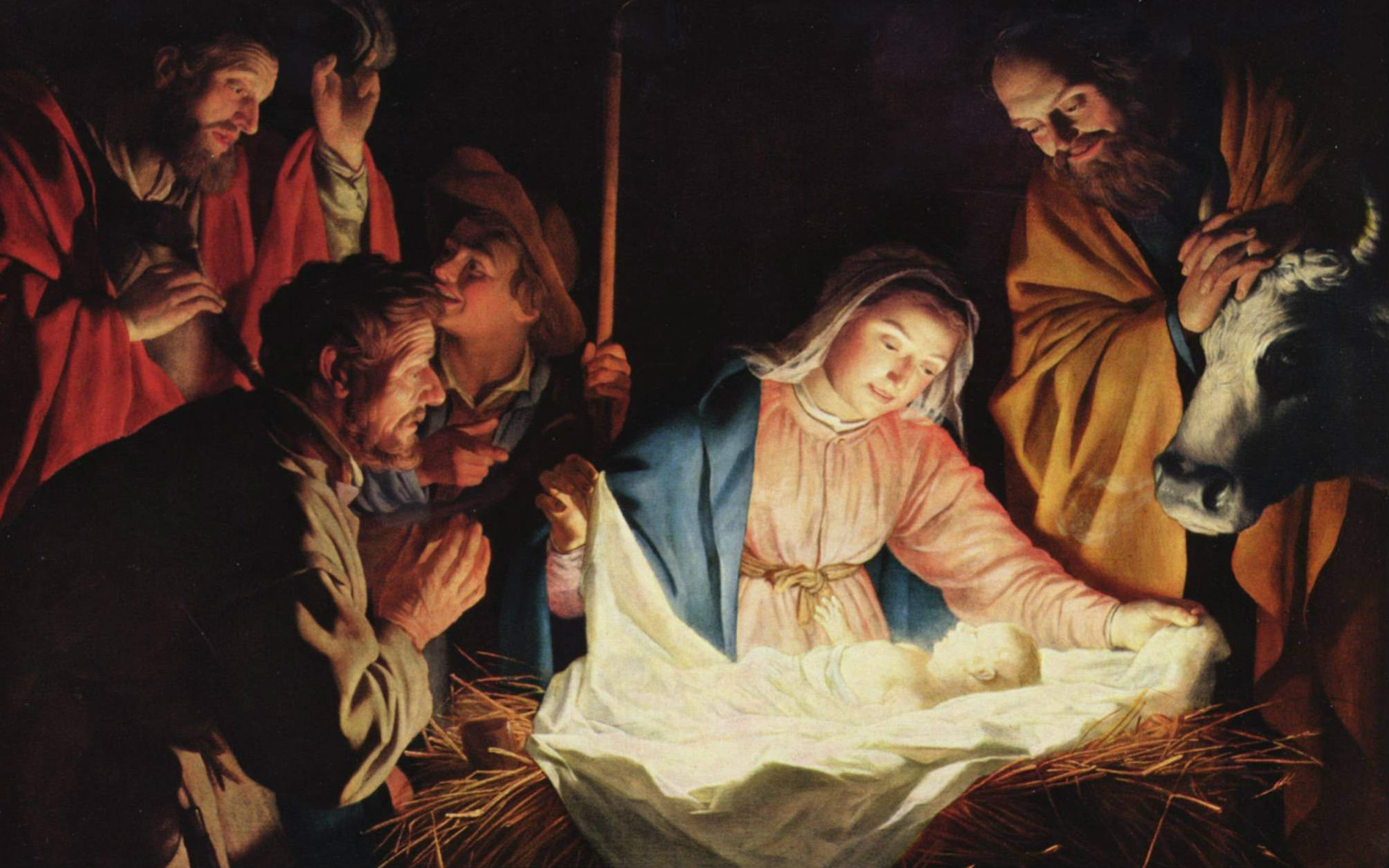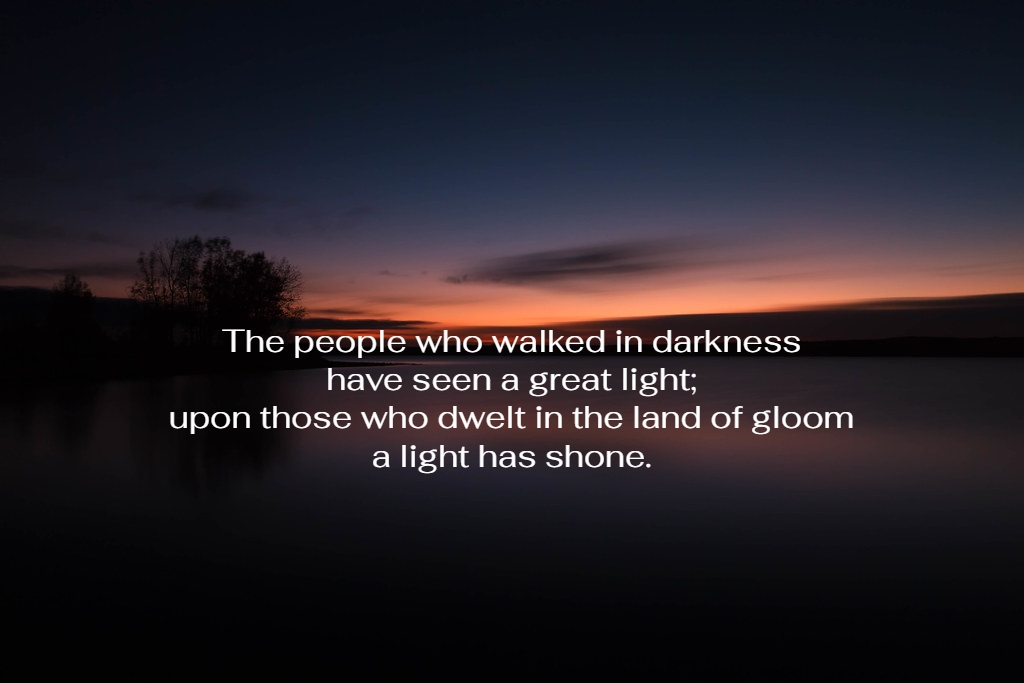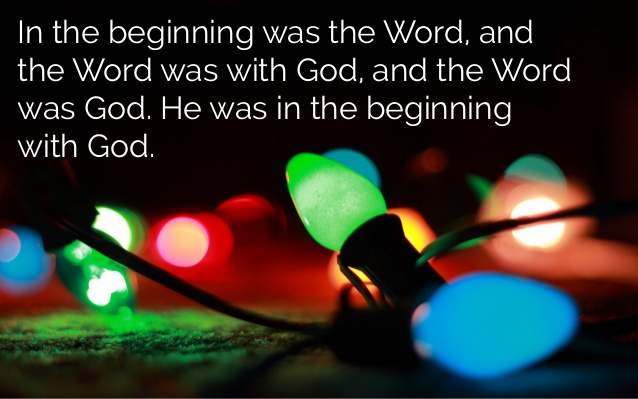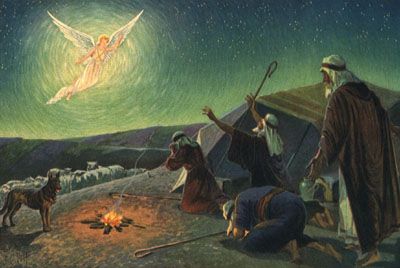Today’s readings
The people who walked in darkness
have seen a great light;
upon those who dwelt in the land of gloom
a light has shone.
Sometimes, when I am preaching at a reconciliation service for children, I will ask how many of them are, or ever have been, afraid of the dark. I ask the parents too. Lots of us raise our hands. Because darkness is a fearsome thing. In those homilies, I liken the darkness to sin, which is fearsome as well, because it takes us out of relationship with God, out of relationship with the people in our lives, and out of relationship with the Church.
None of us likes darkness. One of the things I like to do this time of year is to drive around the neighborhoods I pass through and look at the Christmas lights. Some of them are very elaborate, some are almost what I like to call “Griswoldian,” after the characters in the movie “Christmas Vacation.” I know that I look forward to putting up the lights for Christmas, and I always love to see the creativity of others who have lit their houses. As the days get shorter and the nights get longer, as darkness comes earlier and earlier, having brightly lit trees and houses seems to be a way of ordering the darkness to get lost and not to terrify us any longer. We are a people who crave the light, who need it at the very core of our beings. We were not made for darkness, but for light.
Some of us this Advent were reading and discussing a little book called, “The Heart that Grew Three Sizes.” The book was based on the popular Dr. Seuss classic, “How the Grinch Stole Christmas.” If you were part of that study, you know there were a lot of gems in that book and it gave us a wonderful new perspective to look at Advent and our faith. One of my favorite parts of the book was when author Matt Rawle took on the theme of light and darkness. Here is what he noticed in the story:
“When the Grinch begins shoving the Who family’s Christmas tree into the chimney at night, he notices young Cindy Lou Who standing and watching him. She asks why the Grinch is taking the tree away. Without so much as a blink, the Grinch says that the lights on one side of the tree aren’t working, and he’s taking the tree to his workshop where he will fix it up and bring it back.” He goes on to say that a tree without lights is fine for holding ornaments or putting gifts under, but without the lights, it’s definitely missing something. In the same way, the Grinch certainly had a heart, but it was three sizes too small: it was missing something.
The darkness is like that. When a room is dark, like when we are walking to the bathroom in the middle of the night, there is stuff between us and the bathroom, and if we are not careful, we will walk into it or on it, or trip over it. It’s the same room during the day, but in the night, it is missing something, namely the light, which helps us to interact with the room the way we should.
When I visited the Holy Land a couple of years ago, I had an experience in Bethlehem that allowed me to reflect on what missing the light meant for the shepherds. I got to visit what is called the “Shepherds’ Field,” which may or may not have been where the shepherds met the angels, but even if it’s not the exact place, one could certainly imagine it happening in there or a place an awful lot like it. It was quiet and peaceful when we visited during the day. It was about 90 degrees out, and so the shade from the numerous trees in the field and the slight breeze was certainly welcome. As I sat on a bench in the field, I tried to imagine what it might have been like at night, when the shepherds were there. Now they were used to the darkness, and probably were able to see most hazards from the ambient light of the moon and stars. And I’m sure they kept a watchful eye through the night for the gleam of light reflecting off the eyes of any predators that might be nearby. They were used to the darkness.
Sometimes we get used to the darkness too, perhaps a little too used to it. We become used to what we see: the shadows, the darkness, even the sadness around us. Bad news doesn’t surprise us anymore. More crime in the streets, another school shooting, people doing smash and grab robberies in stores, the latest COVID variant filling up the hospitals. There’s a whole lot of darkness out there, and sometimes I think the way we deal with all that darkness is to let it desensitize us. The real surprise on the evening news is the occasional human-interest story about something positive happening somewhere in our world. We get very used to our day-to-day lives, filled as they are with long to-do lists, running from one errand or event to the next, managing the stress, frustration, and anxiety that come from falling behind in one area or the other. This is the dim light we become used to.
For the shepherds, the bright light of the angels’ presence was startling. They weren’t used to the light, and in the darkness of the night, they were probably blinded by it, in much the same way as the light of the Griswolds’ house blinded his neighbor and caused him to fall down the stairs. It’s no wonder they were afraid: they could hardly see, and what they could see was the surprising appearance of an angel into their mundane nightly watch. But as their eyes adjust to the light, they experience the glory of God and the reassurance of an infant lying in a manger, an infant who is Christ and Lord and Savior of all.
Into our dimly lit lives, our God wants to shine the splendor of his glory. The birth of his only begotten Son into our world isn’t just a nice event depicted on Christmas cards or Nativity scenes. The birth of his only begotten Son is meant to change the world, including the dimly-lit recesses of our daily existence. This is amazing grace. This is an indwelling of God that changes the world and changes our lives.
It’s incredible, because when you think about it, God doesn’t have to care about our welfare or our salvation. He’s God, he’s not in need of anyone or anything, because he is all-sufficient. He doesn’t need our love, he doesn’t need our praise, he doesn’t need our contrition … honestly, he doesn’t need us period. But he wants us. Love wants the beloved. Grace wants the penitent. Goodness and truth and beauty want the worn and weary. And so our God pursues us, and pursues us with great zeal. Isaiah tells us that the zeal of the Lord of Hosts will do this. Indeed that zeal won’t rest until it reaches its perfection in the lives of all of us.
He created us in love, and even though he doesn’t need us, he loves us beyond all imagining, and can’t do anything but that. Throughout time, yes, we’ve disappointed him, and when he forgave us – which he didn’t have to do – we disappointed him again. That’s been the story of us as a people, and also our own personal stories, if we’re honest. How many times have we all sinned, and after being forgiven, go back and sin again? Honestly, if we were God, we’d throw up our hands and walk away. But, thank God, we’re not God, and our God isn’t like that. As often as we turn away and come back, he reaches out to us with the love of the father for his prodigal son. Our God pursues us, and pursues us with great zeal.
When our need for a Savior was great, when ages beyond number had run their course from the creation of the world, when century upon century had passed since the Almighty set his bow in the clouds after the Great Flood, after Abraham, Moses, David and Daniel had made God’s desire for reconciliation known, our Lord Jesus Christ, eternal God and Son of the eternal Father, desired to consecrate the world by his most loving presence. Being conceived in the womb of the Blessed Virgin Mary by the Holy Spirit, he was born in Bethlehem of Judah and was made man. As a man, he walked among the people of his time and lived as one of us, in all things but sin. At the appointed hour, he took on our sins and was nailed to a cross. He died to pay the price for all of us, in order to redeem us and bring us back to friendship with the Father. Because of this, the power of death and sin to keep us from God has been canceled out, and we have the possibility of eternal life. Our God pursues us, and pursues us with great zeal.
It’s no wonder the angels sang that night: they knew what the world had yet to behold. They knew that God’s zeal had obliterated the chasm between the world and its Maker. They knew that the sadness of death was coming to an end. They knew that the power of sin had been smashed to bits. They knew the light of God’s Radiant Dawn had burst forth upon the earth and Emmanuel, God-with-us, became incarnate in our midst. They knew that in this moment, the sad melody of sin had given way to a chorus of God’s glory. They knew that the dirge of death had dwindled to the peace that God pours forth on those whom he favors.
That moment, all those years ago, changed everything. Light shone in the darkness. The glory of the Lord enveloped the earth. Nothing would be the same. The zeal of the Lord of Hosts will do this!







You must be logged in to post a comment.